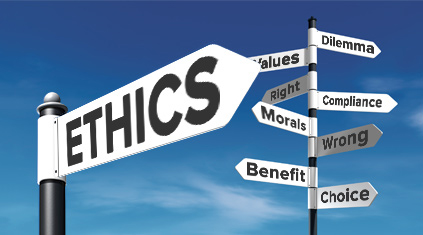I was having an interesting chat with my father about ethicality and legality. He was of the opinion that not every ethical action can be transformed into law and vice versa, and that an action in the confines of a legal system isn’t necessarily always ethical. This little discussion segued into a much more pertinent debate about morals versus ethics.
Just to begin, “Ethics” originated from the Greek word “Ethos” which literally translates to “character.” Now there is a common misconception in which the character of a person is directly associated with that person’s moral integrity. One cannot be more wrong about this. An excellent example of ethics conflicting with morals is the work of a defense attorney. A lawyer’s morals may tell her that rape is reprehensible and that rapists should be severely punished, but her ethics as a professional lawyer require her to defend her client to the best of her abilities, showing strong character even if she knows that the client is guilty. On the flipside, in most parts of the world, a doctor may not euthanize a patient, even at the patient’s demand. However, the same doctor may personally believe in a patient’s right to die, as per the doctor’s own morals.
While morals also prescribe dos and don’ts, morality is ultimately a personal compass of right and wrong. The word “moral” is derived from the Latin word “mos” which means “custom.” As I have come to understand, morality exceeds cultural norms. The usual purpose is to differentiate between good and bad conduct. They are in a way influenced by culture, religion or society, but are personal principles created and upheld by individuals themselves. Whereas, ethics are dependent on others for a classification. They tend to be dependable within a certain context but can differ between contexts. A person strictly following ethical principles may not have any morals at all. Likewise, one could violate ethical principles within a given system of rules in order to maintain moral integrity.
The recent U.S. government shutdown is a case in point. While there are many opportunists looking out only for their interests, there are also worthy men and women who fight with the choices they face. And this is the price of politics: To make a difference in public life, one must be willing to negotiate. This isn’t a new dilemma or one that is peculiar to any nation—it is true for political leaders across time: how they reconcile their actions in public office with the demands of ethics and morality.
I have personally come to the conclusion that morals can influence ethics but ethics will never influence morals, for morals offer an objective truth which is universal and the same regardless of people, culture, history or any other physical changes. Ethics are far more simple and practical and likely to change. For example, racism is both unethical and immoral, but if you supported Nazism to survive in Nazi Germany, you would violate morality and not ethics. Edward Snowden is another excellent example of someone who followed morality but broke ethical codes to notify citizens about their privacy being invaded by CIA technology. So the two are related, but they are actually very different from each other in life and how to determine right from wrong.
“The ethical man knows what is right; the moral man does what is right.” – Anonymous


